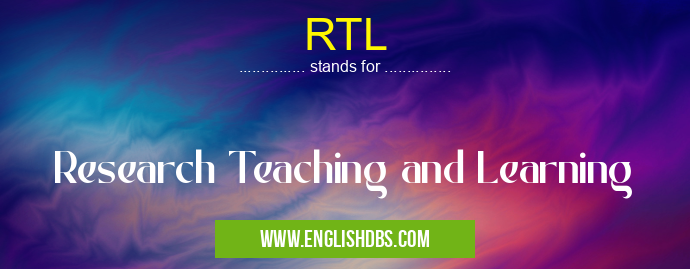What does RTL mean in EDUCATIONAL
RTL (Research Teaching and Learning) is an umbrella term that encompasses various activities and initiatives aimed at improving the quality of teaching and learning in higher education. It involves a systematic approach to identify and address educational challenges, enhance student outcomes, and promote continuous improvement.

RTL meaning in Educational in Community
RTL mostly used in an acronym Educational in Category Community that means Research Teaching and Learning
Shorthand: RTL,
Full Form: Research Teaching and Learning
For more information of "Research Teaching and Learning", see the section below.
» Community » Educational
What does RTL Stand for?
RTL stands for Research Teaching and Learning.
RTL Meaning in COMMUNITY
In the context of higher education, the term "community" often refers to the academic and social environment in which students and faculty interact and collaborate. RTL initiatives within a community involve:
- Collaborative Research: Conducting research that explores effective teaching methodologies, learning strategies, and educational technologies.
- Innovative Teaching: Developing and implementing innovative teaching practices that cater to diverse learner needs and enhance student engagement.
- Evidence-Based Decision Making: Using research findings to inform teaching decisions and improve student learning outcomes.
- Professional Development: Providing opportunities for faculty to develop their teaching skills and stay abreast of best practices.
- Student Support and Engagement: Creating a supportive learning environment that promotes student success and fosters a sense of community.
Essential Questions and Answers on Research Teaching and Learning in "COMMUNITY»EDUCATIONAL"
What is RTL?
RTL stands for Research Teaching and Learning, a holistic approach that integrates research, teaching, and learning in higher education. It emphasizes the interconnectedness of these elements, aiming to enhance student learning outcomes, advance knowledge, and improve teaching practices.
How does RTL benefit students?
RTL provides students with opportunities to engage in research-informed teaching, participate in real-world investigations, and connect theory to practice. This fosters critical thinking, problem-solving skills, and a deeper understanding of the subject matter. Students learn how to evaluate information, apply knowledge, and contribute to the creation of new knowledge.
What role does research play in RTL?
Research is integral to RTL. It informs teaching practices, provides evidence-based strategies, and generates new knowledge that can be incorporated into the curriculum. By engaging in research, educators can stay abreast of current developments, improve their teaching methods, and enhance student learning experiences.
How are teaching and learning integrated in RTL?
In RTL, teaching and learning are not separate entities but rather interconnected processes. Teaching is informed by research and learning is facilitated through active engagement, student-centered approaches, and feedback loops. Educators adapt their teaching methods based on student learning outcomes and incorporate research findings to enhance the learning environment.
What are some examples of RTL in practice?
RTL can take various forms, such as incorporating research findings into course materials, implementing research-based teaching strategies, involving students in research projects, and using technology to enhance research and learning experiences. It also includes the use of reflective practices, where educators analyze and evaluate their teaching to improve future outcomes.
Final Words: RTL is a vital component of higher education that contributes to the ongoing improvement of teaching and learning practices. By fostering a culture of research, innovation, and collaboration, RTL initiatives empower faculty and students to achieve their full potential and enhance the overall quality of the educational experience.
RTL also stands for: |
|
| All stands for RTL |
